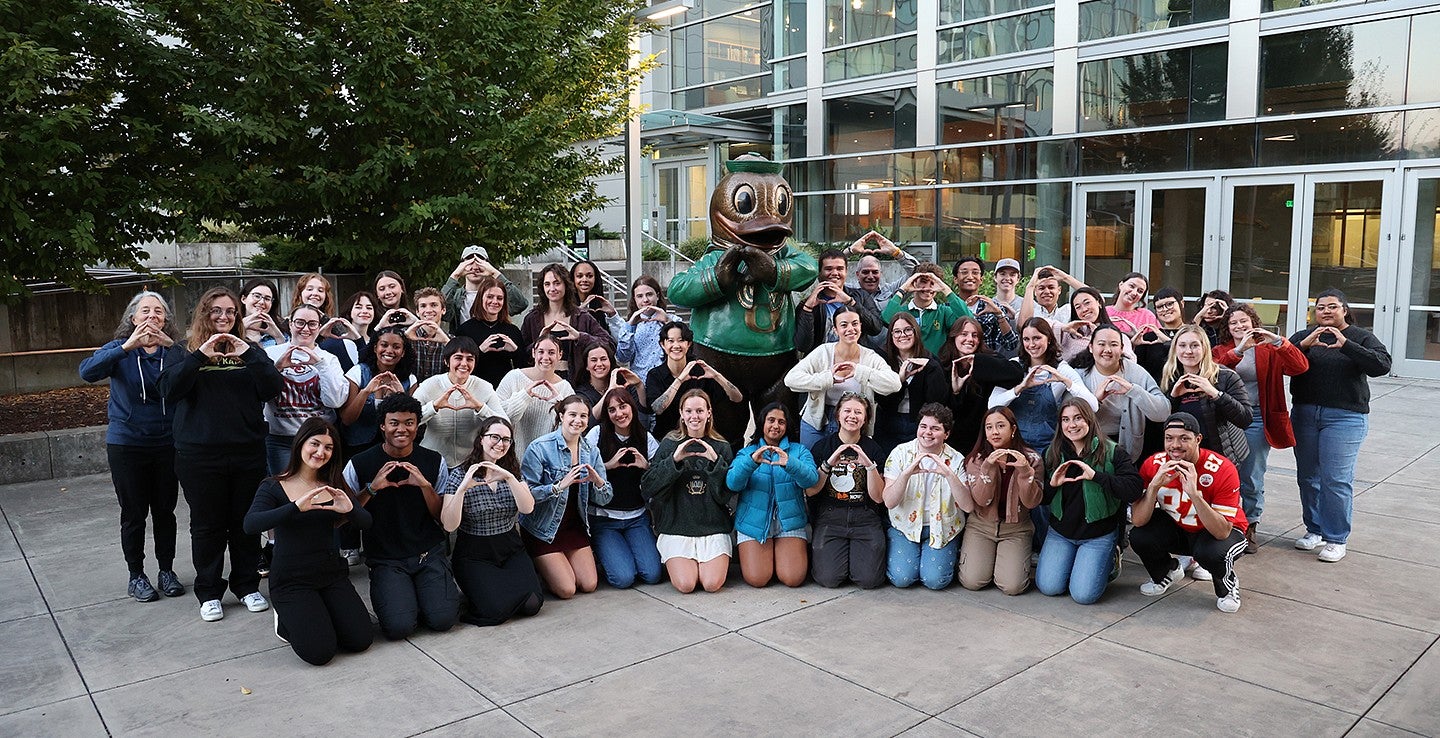
Wayne Morse Scholars in the CHC change life on campus and beyond
Kavi Shrestha wanted to grow as an activist. Daisy O’Hearn yearned for more experiences to become a changemaker in leadership. And Chloé Webster wanted to feed her passion for politics and student government.
So where did these three Clark Honors College students turn to fulfill those needs? The UO’s Wayne Morse Scholars Program.
Each year, the program — sponsored by the Wayne Morse Center for Law and Politics — works with dozens of UO students who learn about the inner workings of democracy, government and politics. They attend local workshops, visit with civic leaders across Oregon, and hone their leadership skills to serve their communities.
Wayne Morse Scholars attend monthly lunches with guest speakers. They take part in political science coursework and go on field trips to Salem, the state capital. Students apply in the spring and, if accepted, begin at least a two-year commitment to the program in the fall.
Dan Tichenor, a professor of political science and the Philip H. Knight Chair of Social Science, started the program 10 years ago to provide networking opportunities and a politically active community for UO students interested in politics, justice and law. He teaches one of the required courses for the program, “Democratic Dilemmas,” which asks students to evaluate United States democracy in real time.
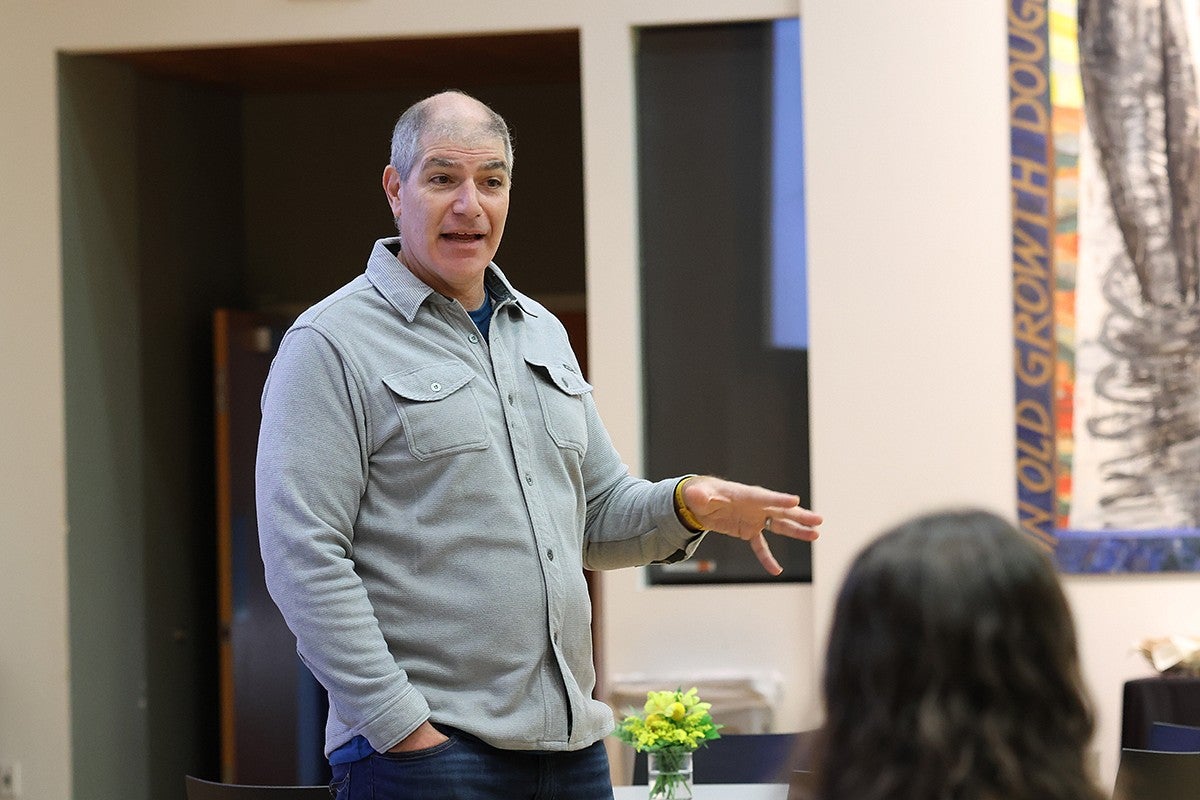
He looks forward to an assignment where the scholars role-play as legislators. “Students were randomly assigned roles as U.S. Senators and did a great job negotiating and debating immigration reform,” he says. He loves group projects that tackle democratic challenges, such as Supreme Court legitimacy, Chloé Webster’s topic in the class.
Webster says the program has helped her find a community of students who remind her how important being politically active in your community is.
“It gives me the energy to stay in the political world,” Webster says, “even when I feel like I don’t belong in it.”
Abbie Stillie, the associate director of the Wayne Morse Center, has seen this democratic action firsthand. “They are all interested in learning from each other’s perspectives,” she says of the student scholars. There are more than 20 majors represented within the program. Of the 60 current scholars, 27 are Honors College students.
Clark Honors College Acting Dean Carol Stabile says the program reflects the college’s passion for leadership and engagement. She notes the brave political legacy of Wayne Morse, the fiery former Oregon senator, and sees that same drive in CHC students.
“Many of the Wayne Morse Scholars I’ve known are keenly interested in social justice,” Stabile says. “Our students want to do work that will make the world a better place.”
Meet three of the CHC students who are continuing their political education with the Wayne Morse Scholars Program:
The Leader: Chloé Webster
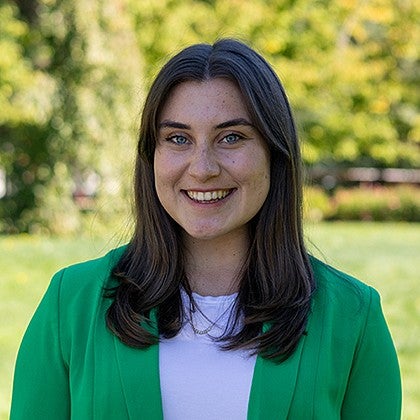
Hometown: Memphis, Tennessee
Year at UO: Junior
Majors: Planning, Public Policy and Management; Social Sciences
“It can be daunting to try to figure out if what you’re saying is right or wrong in a classroom setting. You kind of have the space to just give it a try.”
Chloé Webster rarely had a free moment in high school. She remembers the hours she spent editing her school newspaper, often followed by grueling cross-country practices. The extracurriculars excited her, but what she loved most was being a leader in those programs.
At St. Mary’s Episcopal School in Memphis, Tennessee, she was the editor of her school newspaper and the captain of the varsity cross country team. “I was the person who wanted to do it all,” she said. Webster didn’t want to just “do it all,” though. She’s been learning to lead it all, too.
Moving more than 2,000 miles away from home, Webster followed that passion for leadership all the way to Eugene. Now, she’s found herself with a seat at the table in student government. And not just any seat. She’s the university’s ASUO president. “It’s craziness,” Webster says, “but it’s great.”
She’s busier than ever these days. The first day of winter term meant attending three meetings, an interview with the Daily Emerald, 40 emails and 38 Microsoft Teams messages. And she also had a class on policy analysis.
Joining the Wayne Morse Scholars Program wasn’t a second thought for Webster. The monthly lunches, the field trips, the guest speakers — they all were designed to teach her to be a better leader.
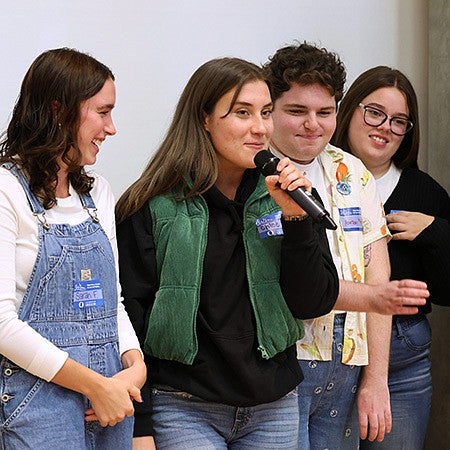
Of the two required courses for the Wayne Morse Scholars Program, Webster enjoyed Tichenor’s seminar-style class, “Democratic Dilemmas.” She recalls each student studying a different politician’s views on immigration. The in-class debates and legislative compromises that ensued were fascinating, she says.
“It also challenged me to speak up and articulate a competent answer about a hard political topic,” she says. “It can be daunting to try to figure out if what you're saying is right or wrong in a classroom setting. You kind of have the space to just give it a try.”
Current Oregon State Senator Wlnsvey Campos visited a Wayne Morse Scholars lunch last year. Her guest lecture struck a chord with Webster. “She showed us it doesn’t matter how old you are. It doesn’t matter what your background is,” Webster recalls. “Young people shouldn’t be afraid to get involved.”
Webster often finds herself in Salem, fighting for legislation that benefits UO students. Webster and her team are currently advocating for a 2024 Student Emergency Needs Package.
As she contemplates graduating next year, Webster is keeping her options open. Her planning, public policy and management degree is versatile, she says, and she’s considering law or graduate school. Wherever she ends up, be it Oregon or Tennessee, the people in her community will benefit.
The Activist: Kavi Shrestha
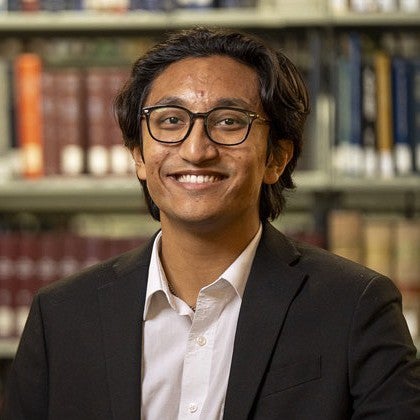
Hometown: Tigard
Year at UO: Senior
Majors: Political Science; Global Studies
“The power of people coming together, fighting for a cause larger than themselves — it was inspiring.”
On a drizzly Saturday morning in Portland, Kavi Shrestha found himself in the front row of a sea of protestors. Then a sophomore in high school, Shrestha had never been to a rally of any kind, much less a national protest fighting for gun control. His outrage after seeing 14 Florida high schoolers die in a school shooting kickstarted his passion for activism.
Fighting for a cause inspired him, but so did the community of protesters. Most of them had never met before, but they had all put on their rain jackets and rubber boots to exercise their right to assemble for a shared cause. These strangers gave Shrestha his first hands-on lesson in the strength of democracy.
“The power of people coming together, fighting a cause larger than themselves — it was inspiring,” Shrestha recalls. A spark was lit in him that day, one that has only grown.
After the protest, Shrestha gradually got involved in local politics. His days of taking STEM classes, as well as thinking of a career in medicine, paused. He started the Tigard High School chapter of Amnesty International, a human rights group, and campaigned for a local school board candidate.
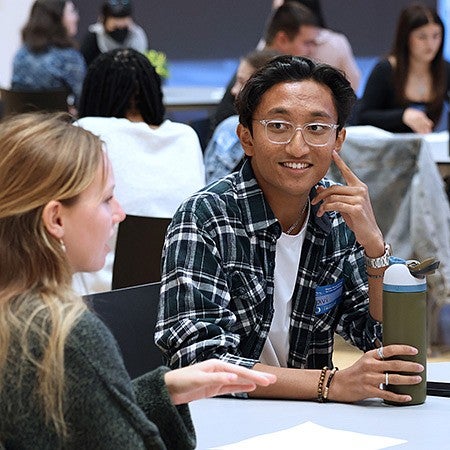
He arrived at UO with his spark of activism now a raging fire. He found his way to the Wayne Morse Scholars Program and also discovered ASUO, serving as vice president.
His time as a Wayne Morse Scholar, along with the community of friends he’s found in the program, have only fueled his passion for advocacy. The program’s lunch meetings are invaluable, he says. Past guest speakers inspired him with their stories of public service and advocacy, and he’s eagerly anticipating a lecture by Anita Hill in May, an event free and open to the public.
“People who are truly interested in public service, in whatever capacity that may be,” he says, have made a difference. “This is just a really supportive community.”
The environment of advocacy he’s immersed himself in at UO is the foundation of his plan for after graduation. He wants to find a job in public health policy. “This line of work — politics — is only possible if you have the right people in your corner,” he says. “You can’t accomplish anything without good people in your corner.”
“I never thought I’d be involved in politics in any capacity,” he says. “I’ve always cared about advocacy, but I never imagined myself being the one making the change.”
The Guide: Daisy O'Hearn

Hometown: Newport
Year at UO: Junior
Majors: Political Science
“I want to give more political opportunities to people who don’t have that privilege or opportunity.”
When Daisy O’Hearn notices something missing in her community, she takes action. Someone needs a tour of Chapman Hall? She’ll walk them around. Young 4-H members need an older student’s example? She’ll show them the ropes.
O’Hearn doesn’t hesitate to guide others along the path she’s already walked. Just like in the 4-H stables and on the golf course where she co-captained her high school team, O’Hearn learned to help newcomers feel at home.
She continued walking her own path of leadership when she arrived at UO. Her time in Global Scholars Hall during her freshman year gave her the opportunity to work with the Residence Hall Association.
For the last two years, she’s been the association’s assistant director of programming. Many of her evenings are spent organizing movie nights, leading activities, and planning events to entertain and teach students.
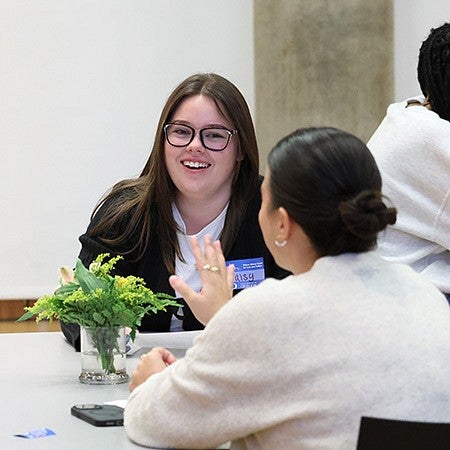
Her work making students feel at home in a new space doesn’t stop at the doors of residence halls, either. She’s a tour guide at Chapman Hall, the home of the Clark Honors College. With the building being smaller than others on campus, O’Hearn loves helping create the home-like feel and tight-knit community.
A professor recommended the Wayne Morse Scholars Program to O’Hearn her freshman year. She applied with the hopes of being part of something bigger than herself. “I’ve learned that choosing to help just one person can change everything,” O’Hearn says.
With the help of ASUO – where she interns – and the Residence Hall Association, O’Hearn was able to organize a giveaway of personal care products for students to have.
Seeing respectful debates in her Wayne Morse Scholars classes showed her the importance of listening as well as advocating. “There are so many opinions out there, and you can’t change everyone’s mind,” she said. “But it’s important to listen and be open to having conversations.”
Once she’s graduated and has guided her last students through Chapman Hall, O’Hearn doesn’t want to stop learning. Showing people the ropes — of their community, their school, or even politics — will guide her path of leadership. “I want to change the world in any aspect,” she says. “Helping people is how the world goes around. It’s the least we can do for each other.”
